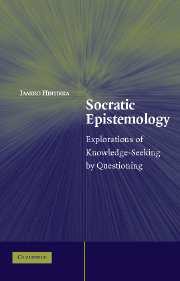Book contents
- Frontmatter
- Contents
- Acknowledgments
- Introduction
- 1 Epistemology without Knowledge and without Belief
- 2 Abduction—Inference, Conjecture, or an Answer to a Question?
- 3 A Second-Generation Epistemic Logic and its General Significance
- 4 Presuppositions and Other Limitations of Inquiry
- 5 The Place of the a priori in Epistemology
- 6 Systems of Visual Identification in Neuroscience: Lessons from Epistemic Logic
- 7 Logical Explanations
- 8 Who Has Kidnapped the Notion of Information?
- 9 A Fallacious Fallacy?
- 10 Omitting Data—Ethical or Strategic Problem?
- Index
- References
5 - The Place of the a priori in Epistemology
Published online by Cambridge University Press: 05 June 2012
- Frontmatter
- Contents
- Acknowledgments
- Introduction
- 1 Epistemology without Knowledge and without Belief
- 2 Abduction—Inference, Conjecture, or an Answer to a Question?
- 3 A Second-Generation Epistemic Logic and its General Significance
- 4 Presuppositions and Other Limitations of Inquiry
- 5 The Place of the a priori in Epistemology
- 6 Systems of Visual Identification in Neuroscience: Lessons from Epistemic Logic
- 7 Logical Explanations
- 8 Who Has Kidnapped the Notion of Information?
- 9 A Fallacious Fallacy?
- 10 Omitting Data—Ethical or Strategic Problem?
- Index
- References
Summary
The Unreasonable Effectiveness of the a priori in Epistemology
Aristotle said that philosophy begins with the experience of wonder. But different phenomena are experienced as wondrous by different thinkers and to a different degree. The wonder that is the theme of this chapter seems to have struck some non-philosophers more keenly than most professional philosophers. Indeed, the most vivid formulation of the problem is probably in the title of Eugene Wigner's 1960 paper, “The Unreasonable Effectiveness of Mathematics in the Natural Sciences.” Historically speaking, Wigner's amazement is nevertheless little more than another form of the same reaction to the success of mathematics in science as early modern scientists' sense that the “book of the universe is written in mathematical symbols.” For a philosopher, this question is in any case a special case of the general problem of the role of our a priori knowledge, mostly codified in the truths of logic and mathematics, in the structure of our empirical knowledge.
This overall philosophical problem assumes different forms in different contexts. Wigner's puzzle has been taken up in the same form by relatively few philosophers, most extensively by Mark Steiner in his 1998 book, The Applicability of Mathematics as a Philosophical Problem. This problem can be given technical turns—for instance, by asking whether scientific laws can be expected to be computable (recursive), and even more specifically by asking which known laws are in fact computable. (See, e.g., Pour-El and Richards 1989.)
- Type
- Chapter
- Information
- Socratic EpistemologyExplorations of Knowledge-Seeking by Questioning, pp. 107 - 144Publisher: Cambridge University PressPrint publication year: 2007

